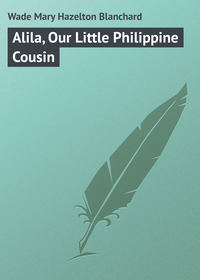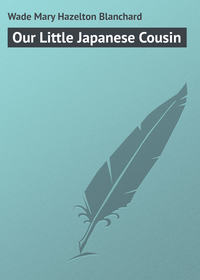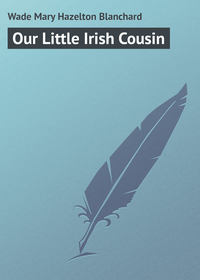 полная версия
полная версияOur Little Russian Cousin
The long, cold winter is gone at last. The ice of the river begins to break up. It has been frozen solid for months, but now it is cracking and softening and beginning to move out to the sea. The commander of the fort on the opposite side of the river discovered this last midnight. He did not wait a single moment. He started at once to carry the glad news to the Emperor, while cannon were fired off from the fort.
When he reached the palace, perhaps you think the attendants kept him waiting because the Czar was asleep. Not at all. He was shown at once into the royal presence. He presented the Czar with a goblet filled with ice-cold water he had brought from the river. This was his way of stating the good news. The Emperor drank to the good fortune of the city, and then filled the goblet with silver for the bringer of the news. In olden times the goblets grew larger every year. It cost the Czar more money each time. At last he said, "Let the glass always be of a certain size, after this." Of course, that settled it.
When the news was brought to the city, everybody was glad. The next day was made a holiday. Petrovna and Ivan were excused from lessons and went out to see the sights.
Eight weeks before Easter, comes Butter-Week. The whole city gives itself up for seven days of feasting and festival. Pancakes are eaten at every meal. Not like the pancakes your mamma makes, my dears. At least, I hope not. For the Russian pancakes, or "blinni," as they are called, are much too rich for your little stomachs. They are made of flour and butter, cooked in butter, and eaten with butter. And not only is this greasy food eaten in quantities, but many other things containing a great deal of fat.
Petrovna's mamma has a blinni party for her friends, and Petrovna has another for her playmates. The family are invited out to blinni parties at other houses. They are the queerest parties you ever heard of. Even in the grandest houses they are held in the kitchen. Perhaps you can guess the reason. The cakes must be eaten hot, as soon as they come off the griddle. Therefore the people must sit as near the stove as possible.
Petrovna eats her favourite cakes, until she can swallow nothing more. By the end of the week her head, as well as her stomach, begins to ache. She is all ready for the seven weeks of fasting before Easter. She is a faithful little girl, and never thinks of fussing because she must now live very quietly. She goes often to church, and repeats many prayers. She eats the simplest food, but all Russia does the same, so she has plenty of company.
The night before Easter comes at last. Petrovna and Ivan do not go to bed as early as usual. They leave home with their parents a little while before midnight. They are going to church. Everybody else in the city goes, too.
The streets are full of carriages as they ride along. Our little Russian cousins are driven to the same cathedral to which you have been with them before. They enter and join the crowd of worshippers. The lights burn dimly. All is silent. The great bell begins to ring the midnight hour. The other bells of the city join. As the last stroke is sounded the priests come out through the doors of the sanctuary. Listen! they are chanting, "Christ is risen! Christ is risen!" The people respond, "Christ is risen."
At the beginning of the chant all begin to move around, kissing friends and acquaintances in every direction. The bells keep pealing forth the glad news. Cannon are fired off throughout the city. Rockets are flashing in the sky. The cathedral itself suddenly becomes ablaze with light.
The kissing lasts all night and during the next day. No one thinks of meeting another without a cordial greeting and a kiss. Old men kiss each other. Old women kiss, children kiss. The Emperor kisses all those of his household. Petrovna's papa kisses his clerks. Petrovna herself, dear little maiden, kisses right and left, with the most loving heart in the world. For this is Easter-time, the glorious time when all should love each other and show it as best they can.
Feasting begins with the kissing. It is a great holiday for everybody. Petrovna's mamma has a grand dinner-party for her friends. But she does not forget those who are not so well off as herself. Many a basket of good things is sent out to poor homes. Many a blessing is given our little Petrovna, who rides about the city leaving her mamma's gifts. Yes, indeed, it is a beautiful time, this Easter day in Russia.
As the weather gets warmer, Petrovna begins to look forward to the great fair of Nijni-Novgorod. It will be a long, long journey. She has never travelled so far in her life before. But dear kind papa has promised her she shall go with him this time. He travels there himself every year to trade with the merchants of far-away countries.
The day before they are ready to start, he comes home earlier than usual from his place of business. He says, "Come, Petrovna and Ivan, ask the maid to put on your best clothes. I am going to take you to the Winter Palace. You have teased me to take you there often enough. Hurry, or we shall not have time."
The children scamper away. They are soon dressed. Their papa looks at his pretty children with pride, as he helps them into the carriage. Away they dash over the pavements till they draw up in front of an immense building. It is painted brownish-red and yellow. The outside is ornamented with the figures of angels, and many other beautiful things.
This is the Winter Palace. It is the largest residence in the whole world. Six thousand people live in it. Shouldn't you be afraid of getting lost there? There is a story that a servant kept some cows in one of the garrets there, a long time ago, and no one found it out for a long while.
Petrovna and Ivan open their eyes wide as they pass through the high gilded halls; they see so many beautiful things to admire. Such richly carved chairs and tables! Such immense vases of malachite and jasper and porphyry! So many fine paintings of the Czars and generals and other great people of Russia!
In the throne-room of Peter the Great the walls are hung with red velvet. Golden eagles are beautifully embroidered upon it. But the royal jewels! How Petrovna's blue eyes sparkle as she looks upon the crown of her Emperor. It is in the shape of a dome, and is studded with large diamonds, with a border of pearls. At the very top of it is an immense ruby. It is very beautiful. The Empress's coronet is most dainty. It is of diamonds of the same size. It is enough to dazzle one with its beauty. In the room where these jewels are kept and guarded there are many others noted all over the world.
The sceptre of the Czar bears one of the largest diamonds ever discovered. Many years ago a rich count gave it to the Empress Catherine II. There are bracelets and necklaces and coronets made of precious stones. It seems as though Petrovna and Ivan had suddenly landed in the cave of Aladdin.
But it is getting late. It is long after their dinner hour. They must leave these beautiful sights and hasten home to mamma.
The morning for the great journey comes. It finds our Russian cousins awake bright and early. The trunks are strapped, the dear baby brother is fondly kissed, and papa, mamma, Petrovna, and Ivan begin their long ride. They pass many little villages as the express train rushes along. Then they go onward over great plains of barley and rye. The train is crowded with others, who are taking the same journey as themselves, and papa talks with many friends who have business at the great fair.
They travel all day and all night, besides several hours of the next day. As they near the end, the weather grows warmer, the trees are larger and the grass greener than at home. For they are farther south. They are too tired to look out of the windows any longer. Petrovna is dozing away, and dreaming of her loved ice-hill, when she finds herself gently shaken. Mamma is smiling at her and saying, "Wake up, my darling, we are here at last."
The train has stopped. Every one is getting out. Our little cousins are helped out of the car into a comfortable low carriage and are driven to a grand hotel. A good dinner is served, and Petrovna and Ivan are put to bed. They must get rested and prepare for the excitement of the coming week. They are both so tired and sleepy they are glad to rest after the long, hard journey.
Perhaps you do not know that this great fair is held every year for the benefit of the people of Asia as well as Russia. After a long night's sleep our merchant's family go out into the streets of the old city and see many curious sights. Men of many nations are gathered together. Chinamen with their long queues and big sleeves are jostling Persians in flowing silk robes and gay turbans. Here are Cossacks mounted on fine horses acting as policemen. There are some gypsies on their way to the fair. They expect to tell fortunes and make much money out of the curious peasants.
What a bustle and commotion! What a discord of strange languages on every side! What variety of costumes, and, above all, what dust!
The fair grounds are about a mile from the hotel. Our little cousins are in as much of a hurry to get there as you would be. It does not take long, however, for the driver of their carriage hurries his horses onward through the crowd.
Now for the fair itself. It is arranged in the shape of a triangle, and covers a square mile. Not an inch of space is wasted. Everything is in order. Every trade has a street of its own. Many of the bazaars have signs in front. These bear the names of all the goods that are sold inside. Petrovna's papa is, of course, interested most in the tea. He wishes to buy a large stock of it for his trade at home. There are many kinds to choose from. But he must be sure to get some of the delicious yellow tea, which he will sell for fifteen dollars a pound. It is said to be made from the flowers of a certain kind of tea-plant, and is quite rare. The wealthy people of Russia like it so much that no one else in the world gets a chance to buy any. So I have heard, at least. If you should drink ever so little of it, you might be kept awake all night. Yet it looks very weak.
Besides many expensive teas, Petrovna's papa orders a large supply of tea-bricks. They are made out of the refuse of the tea, and can be sold to the peasants. Poor creatures! they are glad enough to get this poor stuff, if they cannot afford better.
Now follow Petrovna as she stops at the booth of this richly dressed Persian. See the beautiful rugs and carpets hung up for sale. They will last a lifetime for those who have money enough to buy them.
Here is a whole street devoted to the sale of silks. There are many beautiful shades. Petrovna shall have a piece of delicate yellow to make her a new party dress, while her mamma chooses one of rich brocade. It is heavy enough to stand alone.
Let us go with our travellers and look with them at these exquisite gems, – amethysts, crystals, and the clearest of topaz. Petrovna's papa will buy one of these, no doubt. He will have it set in a ring to give his wife.
Besides all the rich and rare things which Asia can send to the fair, Russia furnishes many things to exchange with her great neighbour. There are all kinds of goods, which have been made in the factories of her cities. The most important are the cotton goods, the cutlery, and the fine articles of silver. There are also immense stores of wheat, barley, and other grains, and quantities of dried fruits.
Especially for her own people, there are bazaars and bazaars filled with samovars of every style, rich furs from the animals of the cold lands of the north, and candles by millions.
Day after day, Petrovna and Ivan wander about the fair grounds. Each time they see something new they wish to buy. When they are tired of looking about in the bazaars, they go to one of the concert-halls. They will be sure to hear some music they like. Or else they go to a theatre, and see a play that makes them laugh till their sides are sore. Perhaps they watch the performance of some jugglers, and try to discover how they do their wonderful tricks. Quite often they go into one of the restaurants with papa. While he is drinking tea and talking over prices with the men he meets, the children have a dainty lunch, and watch the waiters. What queer-looking people they are! They are Tartars. They look much like the Chinese, except that their heads are shaven. They wear white linen shirts and trousers. Their feet are bound with pieces of cloth and encased in sandals.
Among other things, Petrovna watches a band of gypsies. They are the very ones she saw in the streets the day she arrived in the city. Some of them are old and withered and ugly. They look like witches. But others are young and quite handsome, with their black hair and bright dark eyes. The women wear bright-coloured handkerchiefs around their heads, and shawls over their shoulders.
Look! Watch that young girl as she dances and twirls her skirt. She is certainly very pretty and graceful. She stops now and comes up to Petrovna. She wishes to tell her fortune. Mamma says yes. Our little girl gives the gypsy a piece of silver and holds out her hand. The gypsy notices her fine clothing, looks well at her mamma, then closely examines the little white palm. She tells the child that she will be very happy and do much good in the world. As she grows up she will marry a rich count and live in a grand mansion. She says many more pleasant things will happen, and Petrovna smiles and believes it all.
Let us leave our dear little cousin here for the present. Let us hope that the gypsy's prophecy is a true one.
THE END








